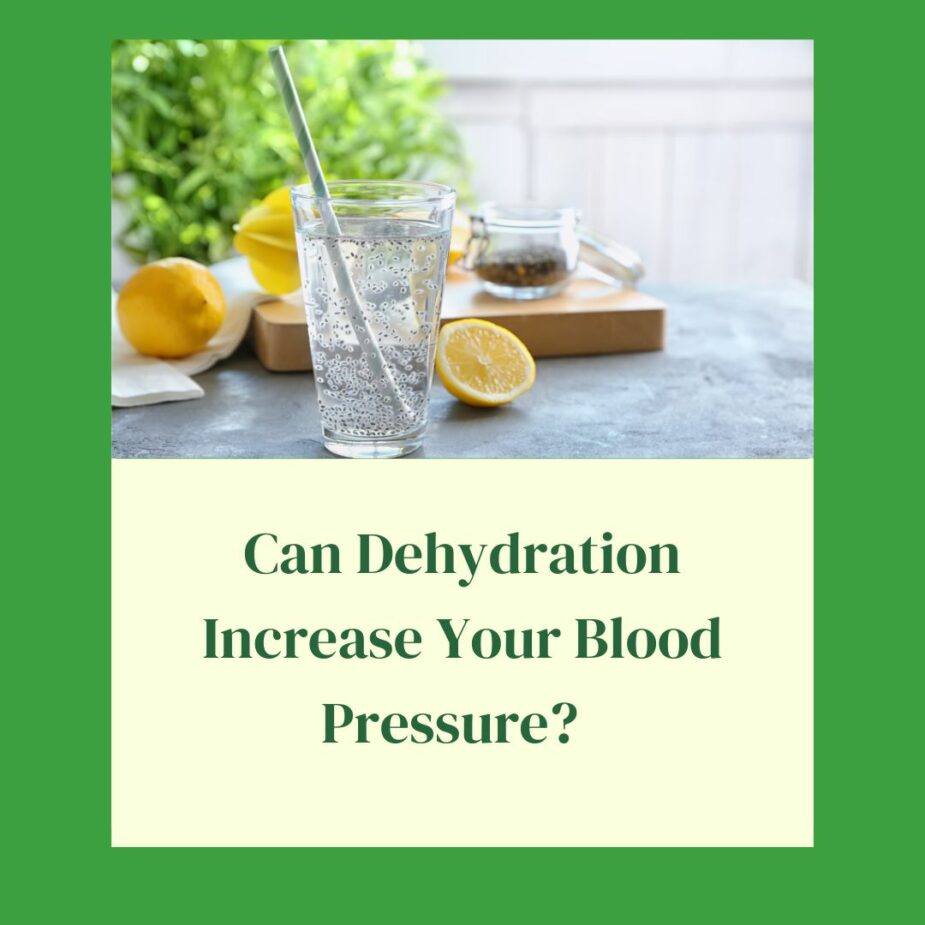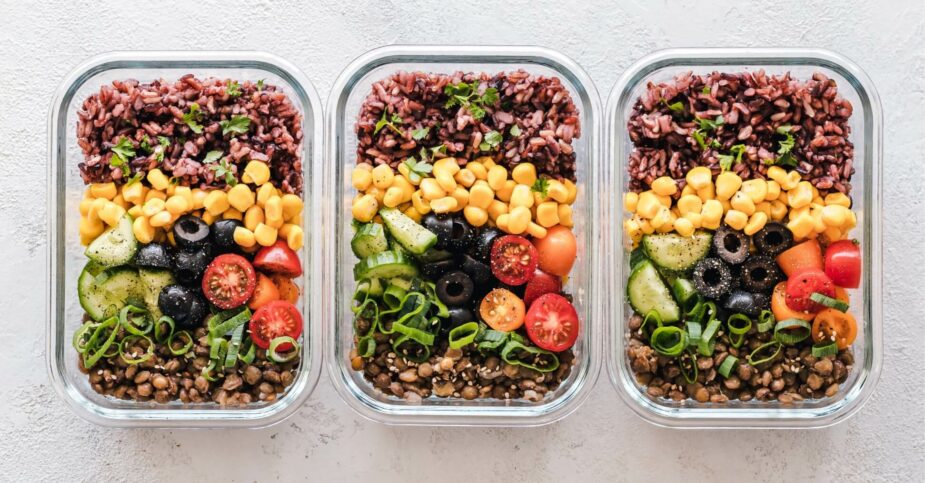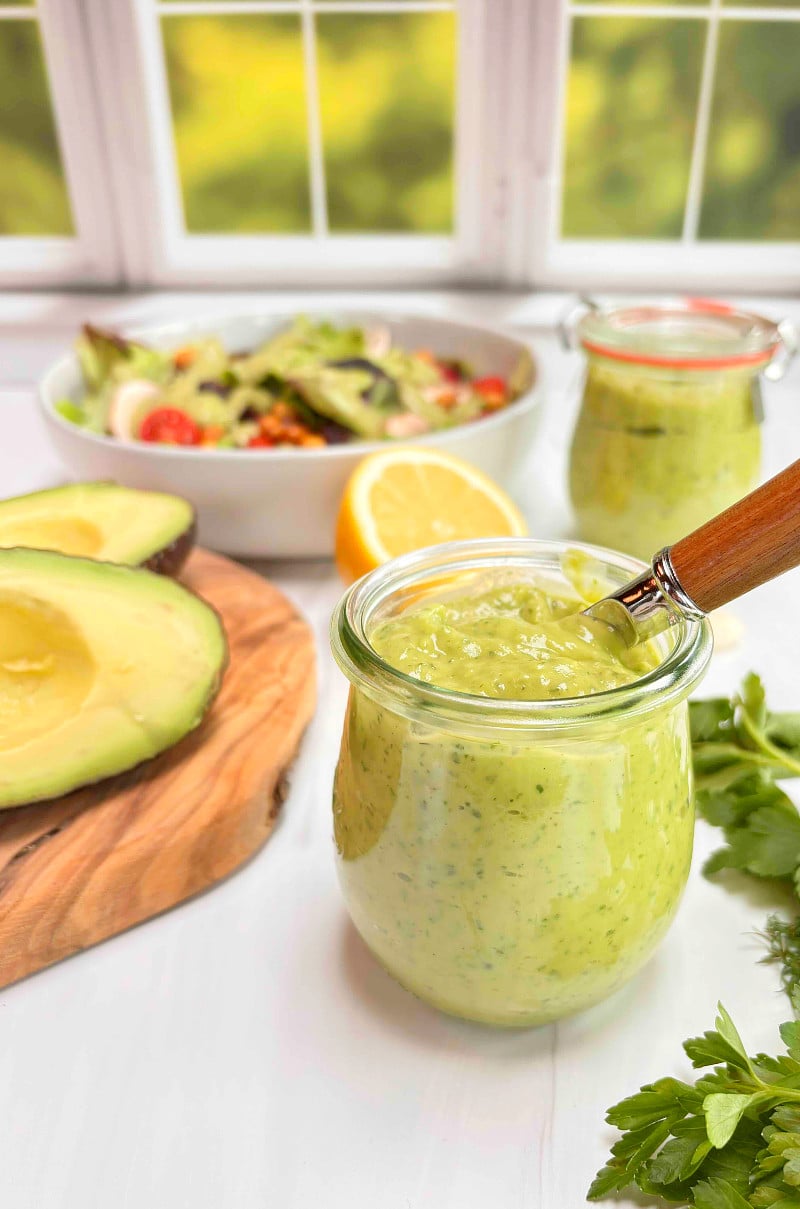Maintaining good health becomes increasingly important as we get older. One often overlooked aspect is hydration. You might be surprised to learn that dehydration can do more than just make you feel thirsty—dehydration can cause high blood pressure and many other health issues too.
Even being just slightly dehydrated can put a strain on many of our internal systems. How much fluid we get can affect everything from how well our brain functions and our energy levels to what our skin looks like and how hard our heart has to work.
Staying well-hydrated is important for our overall health and well-being. It’s a simple thing you can do to help you live a vibrant and healthy life.
Let’s look at 7 ways dehydration can affect your health and some simple ideas to help you stay hydrated.
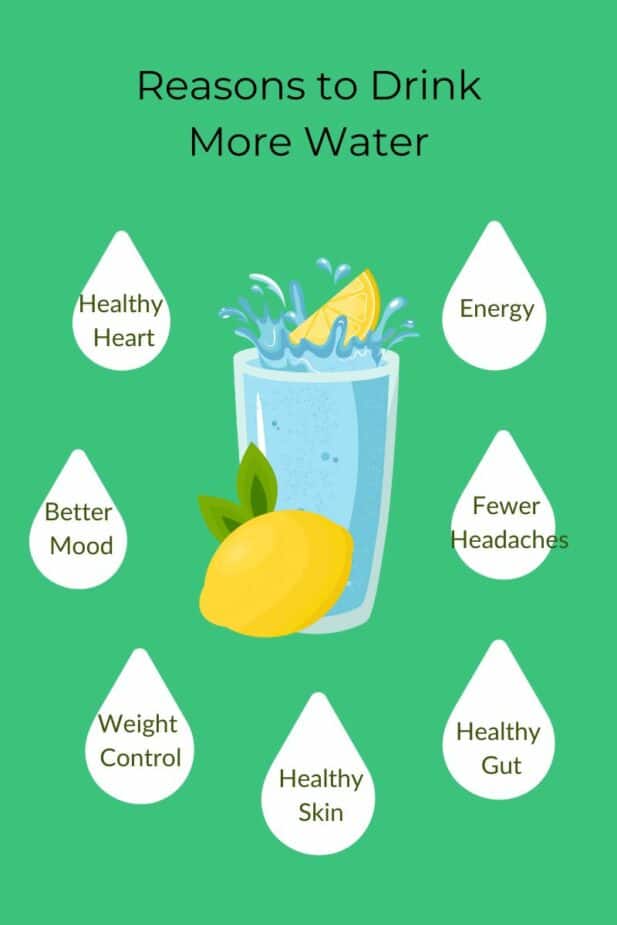
1) Hydration and Blood Pressure
One of the most surprising things is that how well we are hydrated has a big effect on our blood pressure. Lack of enough fluid can cause it to go down, as well as up! Here’s how that happens:
Initially, being low on fluid, or dehydration, causes our blood pressure to go down – this is called hypotension. This occurs because we don’t have enough fluid going into our bloodstream, concentrating our blood and reducing the volume.
When we have less blood – and blood that is thicker and more concentrated it moves more slowly. This lowered blood volume and slow movement initially causes our blood pressure to drop because we aren’t getting enough oxygen and nutrients to our cells. When this happens you may feel a bit lightheaded, dizzy, or faint.
This lower blood volume signals our body to hold on to as much liquid as possible, which triggers the release of a hormone, called vasopressin. When this hormone is released it tells our kidneys to conserve water, reducing the amount you pee.
That hormone also signals your heart to work harder to get oxygen and nutrients where they need to go – increasing your blood pressure. Our heart now has to work that much harder to pump the lower amount of blood through, raising our blood pressure.
This is why dehydration can cause high blood pressure. Researchers feel there is a lot more to learn about how and why this happens but know that being dehydrated can put an extra strain on your heart.
2) Hydration and Brain Health
You may not realize this, but your brain is mainly water! Yup, at least 75% of your brain’s mass is made up of water.
Just being slightly dehydrated may impact how you feel as well as lead to increased anxiety, sleepiness, fatigue, confusion, and an altered mood.
Some research suggests that even a small 1 – 2% loss in body water can affect our brain function. In both men and women, mild dehydration impacted their cognitive performance. Including decreased memory, lowered concentration, anxiety, fatigue, and headaches
3) Hydration and Headaches
Have you ever heard of a “dehydration headache?” It’s that dull ache throughout your head. It may get worse when you bend over or tilt your head down.
We all experience headaches every once in a while. While there are many possible causes, one we probably don’t think about is how well-hydrated we are.
Why does this happen? Researchers are still trying to understand exactly why it happens but think there are many possible reasons.
Some thoughts are that a loss of fluid, or decrease of fluid in your body affects your brain too, causing it to shrink. This puts extra pressure on your nerves which can cause pain.
For most people with a dehydration headache, drinking 8 – 16 ounces of fluid and resting for a bit will help it dissipate.
4) Hydration and Energy
We know that being dehydrated can affect our physical performance, but for the average person, staying hydrated is also a key to our everyday energy levels. As we talked about, dehydration affects our blood volume. When it is low, less oxygen is carried through our body.
Along with less oxygen being delivered, fewer nutrients and less glucose are available to our brain which can lead to physical and mental fatigue.
So we compensate with caffeine to give ourselves a boost – and while a bit is okay it is best not to overdo it. While caffeinated drinks count as fluid, they can also make us urinate more than normal so too much may not help our hydration levels.
5) Hydration and Skin Health
can cause inflammation and infections. Our skin also holds nutrients and water and regulates our body temperature.
You know that scratchy skin feeling…for me, it happens most often during the cold winter months, but as I get older I have noticed my skin is drier than it used to be throughout the year. I’ve also noticed the more water I drink the better my skin looks.
Hydration helps our skin in more ways than just dryness though. Fluids keep our skin elastic, meaning your skin can stretch and pull without ripping. It helps your skin look soft and smooth.
Will it prevent wrinkles? Oh, how I wish! Unfortunately, it won’t help that little sign of aging, but it will help keep your skin healthy and looking its best.
6) Hydration and Gut Health
Fluids help move food through our GI tract which in turn helps our body digest and absorb nutrients.
Fluids combine with fiber in your stomach and intestine, making it easier for food waste to move through your GI tract. When we don’t drink enough water or eat enough foods that are hydrating our GI tract pulls whatever fluid it can find into the waste to keep it moving. As a result, our stool becomes harder to move through and our GI tract becomes more sluggish.
You can think of it as a traffic jam. The less fluid, the slower the traffic moves. This can lead to constipation.
7) Hydration and Weight Control
Can being well-hydrated really help you manage your weight? Well, yes and no. It largely depends on what you are eating or drinking for hydration that makes a difference.
Drinking water in place of sugar-sweetened beverages at meals has been shown to help reduce calorie intake at meals. Other research has shown that drinking more water before meals, in addition to following a weight loss plan, can help reduce weight and body fat.
What about sugar-free beverages and weight control? This has been a controversial topic recently with the World Health Organization (WHO) issuing recommendations not to use sugar substitutes as a means of weight control. However, the research on this largely doesn’t support this.
The American Heart Association and the American Diabetes Association, along with Diabetes UK all state that the use of non-calorie sweeteners can be a useful strategy for weight control and blood glucose control.
I suggest my clients choose water first and enjoy sugar-free beverages in moderation. Moderation in my practice means 1-2 sugar-free drinks a day. Both water and sugar-free beverages can help manage weight.
Tips to Help You Stay Hydrated During the Day
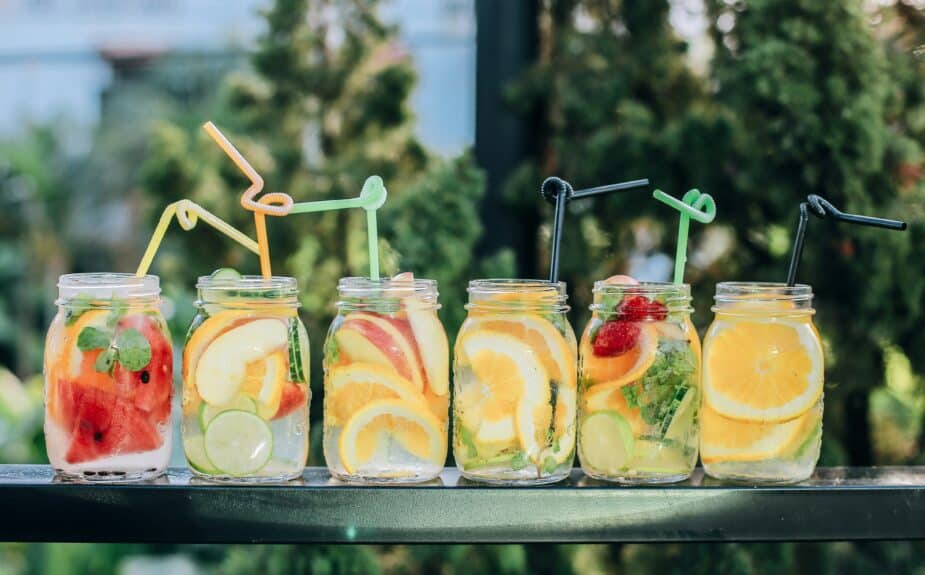
When you aren’t used to drinking water it may seem overwhelming to start adding it in. Starting slow and pacing yourself throughout the day is key. Here are a few tips to help you add a few extra glasses of water during the day to stay hydrated.
- Start the day off with drinking a glass of water while you get ready in the morning.
- Always serve a glass of water with meals and sip on it throughout the meal.
- Keep a reusable water bottle on your desk and sip while you work.
- Add slices of fruit to your water if you don’t like plain water. (And a fun straw never hurts either!)
- Place pieces of fruit or mint leaves in the wells of an ice cube tray. Fill it with water and freeze it. Then use those ice cubes in your water. (It’s pretty and delicious!)
And keep in mind, you don’t have to just drink plain water!
Other foods and fluids count toward hydration. Check out these two articles for more ideas and fun recipes. “How to Avoid Dehydration: Advice for Wise Women and Active Midlifers” and “Fun Summer Drinks to Stay Hydrated All Summer Long”
Key Takeaways About Hydration and Health
Our bodies are about 60% water and getting enough fluid every day can keep our body healthy and mind sharp. Even slight dehydration can cause high blood pressure, fatigue, and slow brain function. Drinking enough fluid throughout the day can help ward off headaches, improve digestion, and even help manage our weight.
Focusing on staying well hydrated is another important step we can take to aging gracefully and living a vibrant active life.
Are you looking for more tips and ideas to help you live an active, vibrant life? Join my community and I’ll send you my 7-day MIND Diet Meal plan complete with recipes and a shopping guide that will help boost your brain health.

